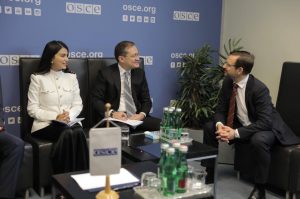Komil Allamjonov, the former deputy head of the Presidential Administration and previously head of the Information Policy Department in Uzbekistan’s Presidential Administration, survived an assassination attempt on October 26. According to Uzbekistan’s General Prosecutor’s Office, two unidentified individuals fired multiple gunshots at a Range Rover driven by a civilian identified only as S.S. (the prosecutor’s office has not disclosed his identity) on Ifor Street in Tashkent’s Kibray District at around 1:40 a.m. Allamjonov was reportedly in the vehicle at the time. The attackers fled the scene immediately, and no one was injured.
The incident took place less than a month after Allamjonov abruptly left his post in the administration, a post he had served in for a little over a year. Over the past few years, Allamjonov worked closely with Saida Mirziyoyeva, the daughter of President Shavkat Mirziyoyev and since August 2023 first assistant to the president (the highest position in the administration after the head of state). No official statement has been provided regarding the reason for Allamjonov’s departure or any new appointment.
Who is Allamjonov?
Allamjonov is no ordinary public figure. He is considered the most influential person in Uzbekistan’s media space. Born in 1984, he was a businessman before entering politics. Although he held different positions, his career as a politician took off after the government change in 2016.
In 2017, Allamjonov was appointed a deputy head in the Administration of the President of the Republic of Uzbekistan, taking up the post of press secretary. A year later, he took on the role of acting director-general at the Uzbek Agency for Press and Information in November 2018. The agency was restructured into the Agency for Information and Mass Communications under the Presidential Administration in February 2019 and two months later, Mirziyoyeva joined as his deputy. The two left their posts in 2020 to “continue working in the non-governmental sector.” Two days later, Allamjonov became a chairman of the board of trustees of the Public Foundation for the Support and Development of National Mass Media and Mirziyoyeva again took the role of his deputy.
Allamjonov has often faced criticism and accusations of being involved in monopolistic practices and conflicts of interest due to his activities in the business world. When he was appointed as the deputy head of the Information Policy Department of the Presidential Administration in July 2022, he announced his departure from the business sector. “As of today, I am no longer a businessman,” he wrote in his Telegram channel, citing his intention to avoid any potential conflict of interest as a reason. A year later, in August, 2023, he became the head of the Information Policy Department of the Presidential Administration.
Why Is It Important?
The assassination attempt is unlikely to have been carried out by ordinary citizens, at least not without support from someone with connections. Firearm possession is illegal in Uzbekistan, and acquiring a gun is nearly impossible unless it is issued through a workplace, such as the police force or army. A limited range of weapons are allowed for civilian possession in Uzbekistan: either a hunting weapon such as a rifle with a smooth barrel, sport weapons, or self-defense weapons like gas cylinders or electroshock devices. The General Prosecutor’s Office has not disclosed the type of firearm used in the attack, though Ozodlik reports that the assailants fired five shots from a Makarov pistol. Civilian firearms are required to be single-shot only and must have a magazine capacity limited to ten bullets.
Homicide in general is relatively uncommon in Uzbekistan. The trend is evident in the declining number of registered crimes. The number of people arrested for murder and attempted murder dropped significantly from 883 in 2007 to 384 in 2023, despite the country’s population growing from 28 million in 2010 to 37 million in 2024.
The most high profile assassination attempt was carried out in 1999 against the first president of the country, Islam Karimov. Five car bomb explosions took 16 lives (some estimates say 12) and injured over 100 others. Tashkent sentenced 11 suspects to death and 120 others to lengthy prison terms in connection with the bombings. The primary suspicion was directed toward the Islamic Movement of Uzbekistan, leading Tashkent to strengthen its stance against opposition groups and tighten regulations on religious practices in public places.
A decade later, another assassination attempt unfolded in Tashkent, this time targeting prominent imam Anvar qori Tursunov. On July 31, 2009, three unidentified assailants stabbed the imam nine times right in front of his home before fleeing the scene. Nearly 70 individuals were arrested during the investigation, and the trial was conducted behind closed doors. Neither the identity of the attackers nor the motives behind the crime was ever disclosed. Tursunov survived and served another 10 years as the chief imam-khatib of Tashkent, even assisting in preparing Karimov’s body for burial in 2016.
Currently, one suspect in the attack on Allamjonov has been arrested. But the General Prosecutor’s Office has not disclosed his identity or any further relevant information about the attack.

































